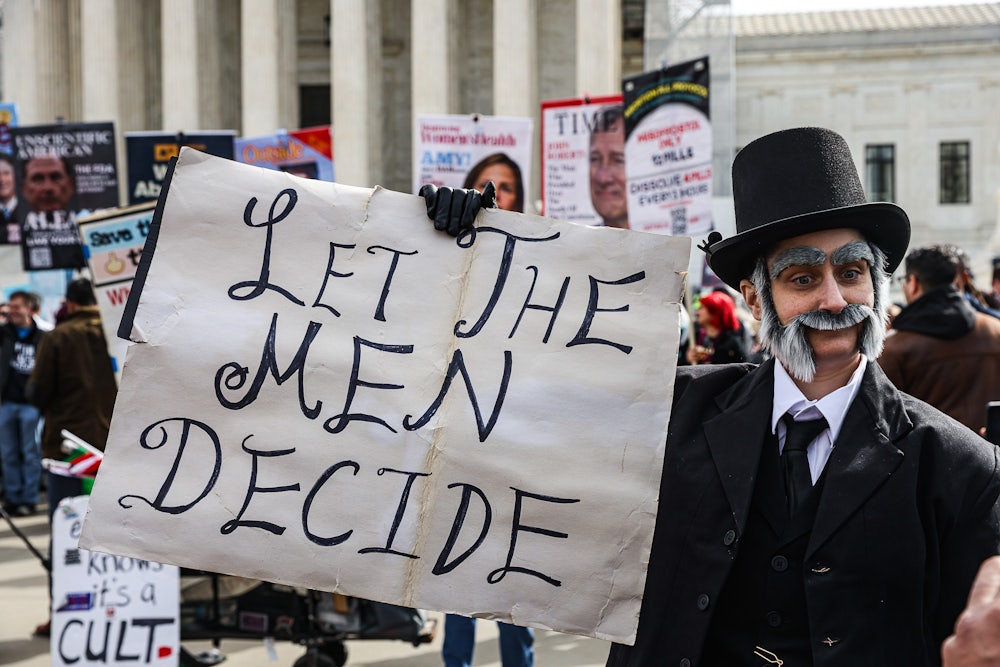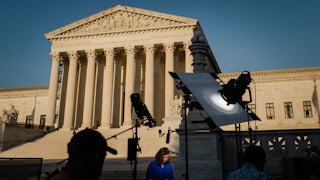Outside the Supreme Court Tuesday morning, ahead of oral argument for a case that could severely restrict access to the abortion drug mifepristone, there were already signs that the court might attempt to revive the 151-year-old Comstock Act as a kind of zombie abortion ban. One young man, who had traveled from Texas for the rally outside court, held the literal sign—handmade, and quoting Judge Matthew Kacsmaryk, who originally heard the case: “The Comstock Act plainly forecloses mail-order abortion.” His sign added two little red hearts for emphasis. The man told me he had not been born yet when the Food and Drug Administration first approved mifepristone in 2000. But later that morning, the words he held up outside the building would be lent credence by two of the court’s staunch anti-abortion justices.
U.S. Food and Drug Administration v. Alliance for Hippocratic Medicine, which the Supreme Court heard Tuesday, is a case in which a group claiming to represent anti-abortion doctors argues that the FDA was wrong to approve mifepristone in 2000 and subsequently to roll back restrictions on its use. The case does not require the court to decide the question of whether or how the Comstock Act should be enforced. But anti-abortion groups in recent years have repeatedly raised the issue of whether the Comstock Act implicitly outlaws the mailing of abortion medication in its blanket ban on the mailing of “obscene” materials. The 1873 law is named for an anti-vice crusader who, in 1915, in the middle of a trial based on the law, died and was mocked over his anti-obscenity “crusade” on the front page of The New York Times.
Justice Samuel Alito was the first to raise Comstock at oral argument Tuesday, asking if the FDA should have taken the act into consideration when approving mifepristone. Significantly, he described the act as “a prominent provision … not some obscure subsection of law,” and said that “everybody in this field knew about it.” At the same time, Alito initially referenced the law only by its numeric criminal code, 1461, something the attorneys trying to block mifepristone access have done at times in their briefs—as if to obscure what they are talking about.
The Comstock Act gets shorthanded as an anti-obscenity law—which it is—but it’s also an anti-abortion law, making it a crime to use the mail to send or receive any device or object that could cause an abortion. Legal scholars have warned that a post-Roe resurrection of the Comstock Act was coming—a way to further attack access to abortion. Medication abortion has helped people in states where abortion is completely or effectively banned, because they can receive pills in the mail from other states and they can safely take them without having to go to a clinic. For the last several months, anti-abortion leaders have been speaking more openly about their plan for using the Comstock Act to ban medication abortion even in states where the procedure is legal, by criminalizing mailing pills.
Justice Clarence Thomas went in another direction with his queries about the Comstock Act. In a back-and-forth with the attorney for Danco Labratories, a mifepristone manufacturer, Thomas asserted that the Comstock Act “specifically covers drugs such as yours,” that the law was “fairly broad,” and that it lacked “safe harbor” for manufacturers. Thomas also asked Erin Hawley, attorney for the Alliance Defending Freedom, the Christian-right legal group representing the Alliance for Hippocratic Medicine, what she thought of what the solicitor general and the Danco attorney said about Comstock, giving her free space to opine. Unsurprisingly, she said she does believe Comstock applies to mailing mifepristone. “The Comstock Act says that drugs should not be mailed either through the mail or through common carriers. So we think that the plain text of that, Your Honor, is pretty clear.”
Hawley was only echoing the position of prominent conservatives and anti-abortion groups who filed briefs in the case. Nearly 150 members of Congress, in their brief, claimed that the Comstock Act should overrule FDA approval of mifepristone, while former U.S. Attorney General Edwin Meese (of the infamous Meese Commission on Pornography) went so far as to argue that the Comstock Act should be used to prosecute people who take mifepristone for self-managed abortion. A report released this month by the advocacy group Governing for Impact outlines the danger posed if the Comstock Act were to be enforced in this way, something also supported by the policy roadmap Project 2025, the mainstream right’s guide for the next conservative president. By asking about the law, said Rachael Klarman, the group’s executive director, Alito was “obviously trying to center the Comstock Act in that way, and make the case that it wouldn’t be a radical thing to enforce the Comstock Act.”
By bringing up the Comstock Act at all, Justices Alito and Thomas may have given credibility to the anti-abortion movement’s claim that the Comstock Act is being violated by mailing pills. And if there were any doubt, it is now dispelled: This law is back from the dead. What that means—and whether Comstock may rise again in the justices’ opinion (or dissents) in this case—remains to be seen.








